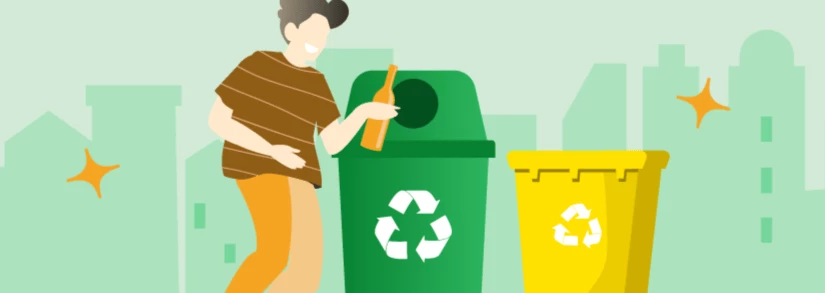Glass Recycling Ireland: Your Options Explained

Glass and metal are highly valuable, endlessly recyclable materials. Understanding the correct methods for disposal is crucial for maximizing recycling quality and quantity in Ireland, particularly with the recent introduction of the Deposit Return Scheme (DRS).
The Role of Glass and Metal in Ireland's Circular Economy
Both glass and metal are considered permanent materials because they can be recycled repeatedly without significant loss of quality.
Glass, made from natural materials like sand and limestone heated to high temperatures, can be melted and reformed.
In Ireland, recycling rates for these materials show mixed performance:
- Glass: Ireland's glass recycling rate is high (around 84%), performing well against EU targets. This success is largely due to the segregated bottle bank system, which minimizes contamination and yields high-quality material (cullet). Recycling glass saves a ton of natural resources for every ton of recycled glass used.
- Metal: While ferrous metals (steel/tin) and aluminium are highly recyclable, their overall packaging recycling rates have experienced challenges. The introduction of the DRS (Re-turn) is expected to significantly boost the recycling rate of aluminium beverage cans.
- Permanent Disposal: Glass and metal materials are inert. If sent to landfill, they can take thousands of years to break down, highlighting the importance of proper recycling to conserve space and resources.
By ensuring proper cleaning and segregation, householders directly support the efficiency of Material Recovery Facilities (MRFs) and contribute to meeting mandatory EU targets, including the overall 65% packaging recycling target for 2025.
How to Recycle Glass and Metal in Ireland
Disposal methods for glass and metal packaging differ, primarily due to the established glass bottle bank system.
1. Glass Recycling
The primary and preferred method for glass packaging disposal is through dedicated bottle banks (bring banks) or Civic Amenity Centres.
- Preparation: Bottles and jars should be rinsed clean to remove residue and prevent attracting pests. Labels and lids do not need to be removed (metal lids go into the metal stream during processing).
- Colour Segregation: Bottle banks feature separate openings for clear, green, and brown glass. This colour segregation is essential for producing high-quality recycled glass (cullet) that can be melted down into new glass of the same colour. Any non-standard colours should typically go in the green glass section.
- Collection Services: Some waste providers, particularly in densely populated areas, offer a dedicated glass kerb side collection bin (often blue or green). Specialist local services (e.g., *glassbag.ie*) may also be available in areas lacking a provider-offered service.
- Transport: If using a bottle bank, waste collection vehicles typically have internally segregated compartments, meaning your separated colours remain separate, even if they appear to enter the same vehicle.
2. Metal Recycling
Metal packaging is collected through the standard dry recycling bin (blue/green lid) or through the new Deposit Return Scheme.
- Beverage Cans (DRS): Aluminium and steel cans (150ml to 3L) that are part of the Re-turn scheme should be returned to Reverse Vending Machines (RVMs) or manual return points to reclaim the deposit. These cans yield the highest quality metal scrap.
- Food Cans & Foil: Clean food tins, steel cans, and aluminium foil (if scrunched into a ball the size of a golf ball or larger) go into the dry recycling bin. They must be clean and dry to avoid contaminating the paper/cardboard in the same bin.
- Lids: Metal lids from glass jars can be placed in the dry recycling bin as well.
The Dos and Don'ts of Glass and Metal Recycling
Correct segregation is paramount. Placing non-recyclable materials in the wrong bin can contaminate entire batches and cause equipment damage at the processing facility.
✅ What IS Accepted (and how to prepare it):
- Glass: Clean food jars, glass bottles (beer, wine, spirits), and non-food glass bottles (e.g., perfume).
- Metal: Clean food and drinks cans, metal lids, and large scrunched aluminium foil.
- Action: All items must be rinsed clean and placed loose in the correct facility (metal in recycling bin; glass in bottle bank).
❌ What is NOT Accepted (and where to take it):
- Drinking Glasses & Ovenware: Items like Pyrex, drinking glasses, leaded crystal, and ceramics are manufactured differently and melt at higher temperatures than container glass. They are contaminants in the glass stream and should go to the General Waste bin.
- Flat Glass: Window panes, mirrors, and safety glass cannot go into bottle banks. Small amounts go in General Waste; large amounts must go to a Civic Amenity Centre.
- Lightbulbs: Standard incandescent bulbs and fluorescent bulbs/tubes contain specialized materials. They must be taken to a local WEEE Centre (Waste Electrical and Electronic Equipment), designated retail drop-off points (e.g., hardware stores), or a Civic Amenity Centre.
- Pots and Pans: These are typically composite metals and must be taken to a Civic Amenity Centre for scrap metal recycling, not the kerb side bin.
For unusually large volumes of glass or metal scrap (e.g., large-scaclear outsuts), Civic Amenity Centres are appropriate. While free for household quantities, commercial or excessive volumes may be subject to a fee.
Local authorities often provide maps of bottle bank and Civic Amenity Centre locations on their websites. You can also refer to the national waste guidelines at MyWaste.ie.
For comprehensive guides on other materials, see our resources on paper and plastic recycling.
